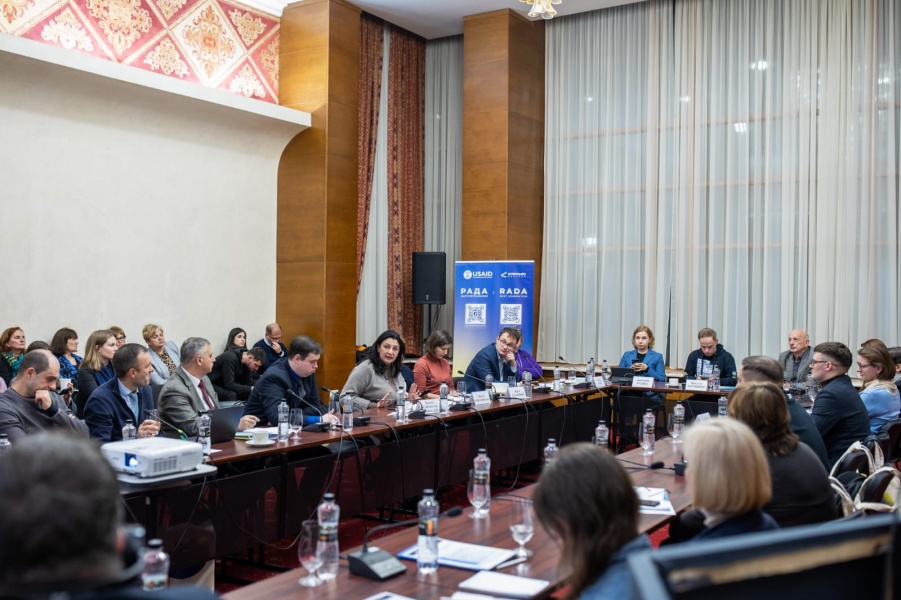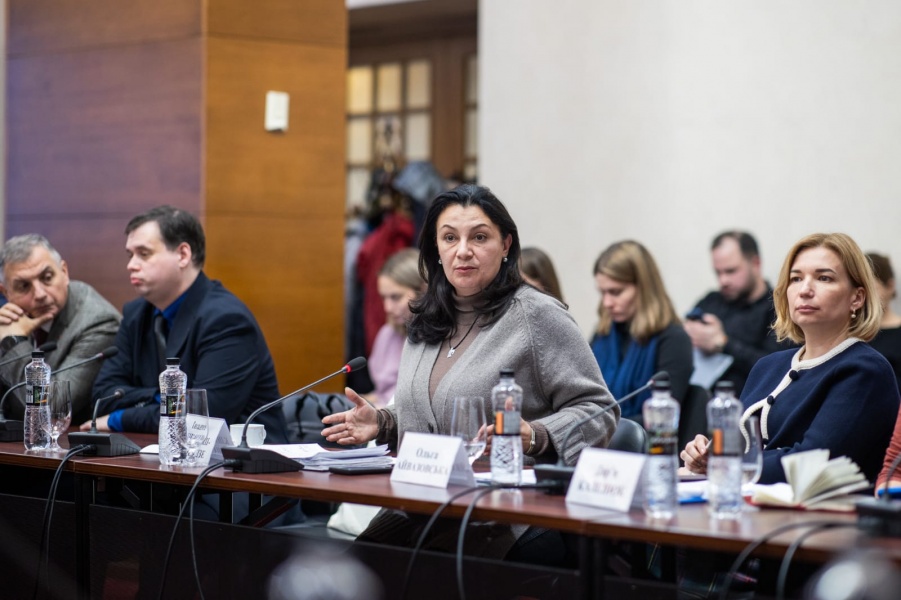
This was emphasised by Ivanna Klympush-Tsintsadze, the Chair of the Committee on Ukraine’s Integration into the EU, during the discussion “Open Verkhovna Rada: Towards International Standards in Times of War.” The discussion was organised by the USAID’s Rada: The Next Generation program.
Ivanna Klympush-Tsintsadze stated that as Ukraine moves towards membership in the European Union and hopes to open negotiations under the Fundamentals cluster next year, it must demonstrate that it meets the criteria under this cluster. “The Fundamentals cluster includes the rule of law, the rights and freedoms of people, the balance of powers, freedom of speech, the openness and accountability of the Parliament, and the transparency of procedures in the Parliament,” said the Chairwoman of the Committee. Therefore, according to her, the Parliament must demonstrate true openness and accountability. This also applies to the admission of journalists to cover the work of the Verkhovna Rada and the publication of the agendas of plenary sessions: “We know many examples, when civil society actors, just via SMS or messages on social networks, attracted the attention of the MPs to planned discussions at the plenary session. If no one knows what will be discussed at the plenary session, this additional valuable quality control will be lacking.”

Ivanna Klympush-Tsintsadze also stressed the importance of broadcasting the work of the Conciliation Council in Parliament. “The society could see who makes decisions, how decisions are made, which political forces stand on what,” said the Chair of the Committee. She emphasised that in a democratic society, it is essential to have trust in governmental institutions. “It is critically important for us to have trust in institutions in times of war and for the sake of this strategic goal of membership in the European Union,” said Ivanna Klympush-Tsintsadze. She once again reminded of the European Commission’s report on Ukraine, recently published as part of the EU enlargement process. In this report, in diplomatic language, the European Commission calls on Ukraine to ensure the openness of the Parliament, media pluralism, respect for the rights of the opposition, and the restoration of decentralisation. “These basic things are exactly what the Fundamentals cluster is about,” said the Committee Chair.
She highlighted that the Parliamentary channel Rada should impartially and proportionally cover the points of view of all members of Parliament, and not just positions convenient for the authorities. She also emphasised the importance of transparent communication regarding the work of both the Verkhovna Rada of Ukraine and Parliamentary Committees. Often, information messages of the Committee on Ukraine’s Integration into the EU do not make it to the Verkhovna Rada website in full. According to the Committee Chair, this is another unacceptable manifestation of censorship. Systematic, professional communication at the level of all committees would make it possible to transparently cover the work of the Parliament and its components. This task should be reflected in Verkhovna Rada’s budget to attract relevant experts. Ivanna Klympush-Tsintsadze also insisted that this communication cannot be centralised at the level of the entire Parliament. “In this case, this will again be about censorship and will only involve communication from those who are at the head of the Parliament. We aim at the systematic, meaningful, deep communication, and not just the kind where we conditionally showed our agendas and post our recording on YouTube,” summed up the Chair of the Committee on Ukraine's Integration into the EU.
Ivanna Klympush-Tsintsadze stated that as Ukraine moves towards membership in the European Union and hopes to open negotiations under the Fundamentals cluster next year, it must demonstrate that it meets the criteria under this cluster. “The Fundamentals cluster includes the rule of law, the rights and freedoms of people, the balance of powers, freedom of speech, the openness and accountability of the Parliament, and the transparency of procedures in the Parliament,” said the Chairwoman of the Committee. Therefore, according to her, the Parliament must demonstrate true openness and accountability. This also applies to the admission of journalists to cover the work of the Verkhovna Rada and the publication of the agendas of plenary sessions: “We know many examples, when civil society actors, just via SMS or messages on social networks, attracted the attention of the MPs to planned discussions at the plenary session. If no one knows what will be discussed at the plenary session, this additional valuable quality control will be lacking.”

Ivanna Klympush-Tsintsadze also stressed the importance of broadcasting the work of the Conciliation Council in Parliament. “The society could see who makes decisions, how decisions are made, which political forces stand on what,” said the Chair of the Committee. She emphasised that in a democratic society, it is essential to have trust in governmental institutions. “It is critically important for us to have trust in institutions in times of war and for the sake of this strategic goal of membership in the European Union,” said Ivanna Klympush-Tsintsadze. She once again reminded of the European Commission’s report on Ukraine, recently published as part of the EU enlargement process. In this report, in diplomatic language, the European Commission calls on Ukraine to ensure the openness of the Parliament, media pluralism, respect for the rights of the opposition, and the restoration of decentralisation. “These basic things are exactly what the Fundamentals cluster is about,” said the Committee Chair.
She highlighted that the Parliamentary channel Rada should impartially and proportionally cover the points of view of all members of Parliament, and not just positions convenient for the authorities. She also emphasised the importance of transparent communication regarding the work of both the Verkhovna Rada of Ukraine and Parliamentary Committees. Often, information messages of the Committee on Ukraine’s Integration into the EU do not make it to the Verkhovna Rada website in full. According to the Committee Chair, this is another unacceptable manifestation of censorship. Systematic, professional communication at the level of all committees would make it possible to transparently cover the work of the Parliament and its components. This task should be reflected in Verkhovna Rada’s budget to attract relevant experts. Ivanna Klympush-Tsintsadze also insisted that this communication cannot be centralised at the level of the entire Parliament. “In this case, this will again be about censorship and will only involve communication from those who are at the head of the Parliament. We aim at the systematic, meaningful, deep communication, and not just the kind where we conditionally showed our agendas and post our recording on YouTube,” summed up the Chair of the Committee on Ukraine's Integration into the EU.
More posts by topic
“News”
24 November 2025 13:08
20 November 2025 16:14
18 November 2025 12:57
13 November 2025 12:34
12 November 2025 12:31
09 November 2025 12:27
17 October 2025 16:54
15 October 2025 16:52
13 October 2025 16:50
10 October 2025 16:47